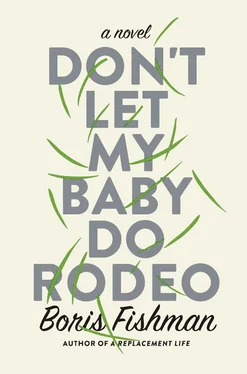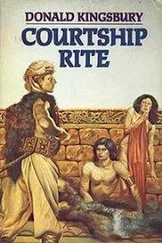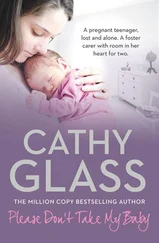Now the ocean took Maya’s breasts in its hands. Really, she could not remember the last time she’d swum, and without clothes. The water was soapy and warm, dreadfully gray if she lowered her head under the line, so she kept it above. With one hand, she pulled down her underwear; it floated up like a thread of spittle, then disappeared inside a whitecap. She lay back, stared at the pocked bowl of the sky, let the blackening water inside her.
Her shoulders flinched and she felt a furry cloud of warmth at her thighs. In her reverie, she had floated out, and off the arch of her back she could see Alex peering out worriedly on the tips of his toes. She raised her right hand, waved. Impatiently, he waved her back to the shore. Through the waves sloshing at her ears, she heard the long call: “Maaaa-ya.” She flipped over and began to cover the distance to shore, her arms moving above the water in a downy fog. As she swam, she imagined a thread furling out of her into the ocean, a line she would reel in when their son arrived at their doorstep.
When she emerged from the water, Alex peeled off his T-shirt and held it out like a cape. As she wrapped herself in it, he fumbled to slide her sand-crusted feet into the loops of her khakis, as if she was incapacitated.
“We’re going to have a child, Alex,” Maya said, watching him work. She dropped the T-shirt and slid her hands into his hair.
“You need to lie down, Maya,” Alex said, working below. He reminded her of her father, tying her shoelaces as she sang songs above his head and slapped at its bald pate.
“I was lying down,” she said.
They walked back to the motel, Alex’s shirtlessness blending unobjectionably with the promenade walkers. Alex supported Maya at the arms, as if she had suffered some kind of attack. She enjoyed the feel of her husband’s arms.
Alex laid Maya into bed and ordered her not to move until he returned with dinner. She watched him step outside and obeyed for some minutes, then sat up, stared at the questionnaire, and took a pencil in hand.
1. How do you give love?
A: To love is to lose. If you love someone, it means: “You winning means more than me winning.”
2. How do you receive love?
A: I don’t know.
3. How do you discipline?
A: I don’t. I want to know why, and I ask, though sometimes there is no answer.
4. Describe a great personal disappointment.
A: I once wished to cook in a café.
In this way, she went down the list. When she arrived at the free essay, she wrote:
A child is a new expedition. The ocean refreshed by a new tributary. A child is strength — as three, we will be stronger than two. And a child is wisdom — he will teach us about ourselves as we will teach him. He will be the truth when we shy from it. Can it be, one day, that we will look on our inability to have children as a blessing, because it brought him into our lives? I don’t know. The birth of a child is one of the greatest joys a human being can receive. When it’s replaced by grief because it can’t happen, the grief is as large as the joy was. (Was supposed to be.) But I will not say no. I will hope. In the meantime. .
After finishing, Maya felt an enormous exhaustion — she could not even reread what she had written. She wondered if she had caught a chill in the ocean. She pulled the tasseled edges off the bed and climbed underneath. She would nap for a minute and wake up when Alex came in. She fell asleep quickly, only laughing once because she thought: What I wrote was so boring, it’s put me to sleep!
She awoke she could not say how much later, though the lights of the room were still burning. She faced Alex’s back — the room smelled of fried fish and potatoes. Alex heard her stir and swiveled in the chair. “I didn’t want to wake you,” he said. “There’s fried haddock and French fries. Best I could find. Everything’s fried here.”
She inquired sleepily what he was doing.
“I want to read to you some of these answers,” he said. “Do you want a cup of hot water? No lemon.”
She held a palm to her forehead. “I’m fine,” she said drowsily.
“Number one,” he said. “How do you give love? One can express love through presents, a hug, or a vacation. How do you receive love? With open arms! How do you discipline? A child must know boundaries, but there will be no spanking in our home. Describe a great personal disappointment. We have lived a beautiful life. Our only disappointment is the one that brings us to this application.”
Then he read the free essay. Alex kept several of Maya’s phrases, for instance “the ocean refreshed by a new tributary,” but otherwise he wrote about making a long journey to their present station (initially, he left the details vague, on the off chance the birth parents were of anti-immigrant cast), but now, having arrived in New Jersey, the Rubin appetite for wandering had been exhausted and the family wished to root in the soil like a tree. They wished to iterate and reiterate; they wished to put down generations, so in a hundred and fifty years, the great-grandchildren of their adopted son or daughter (in the name of increasing their chances, they could not very well leave Maya’s careless assumption that it would be a boy) would feel as solidly American as the birth parents themselves. In this way, Alex betrayed the immigrant identity of the writers, but, he reasoned, the immigrant story was beloved by Americans, and, on second thought, there was no reason to hide it. Financially, the Rubins were finally ready for adoption (“you have to let them know the child won’t starve,” Alex explained to Maya). And even though the child’s grandfather was standing by with a lengthy exercise list, that regimen would not begin for at least three months after adoption. “Funny doesn’t hurt,” Alex murmured behind his back. But Maya was asleep once again.
The next day, Alex’s entry was unanimously voted #1 by the other participants. Alex, forgetting his resentment of them, smiled shyly. Maya wanted to take him by the shoulders and shake him — when he agreed to unshell himself, the world loved him. The agency presenter asked him to talk about his method. “This will be new information for my wife, too,” Alex said. “The woman sleeps and the man works.” He winked at her and the group rocked with laughter.
Alex withdrew a greasy newspaper. He had gone for takeout — fried fish. They came for a son, they left with a heart attack, ha-ha. Maya, still groggy after twelve hours of sleep, wondered who this wisecracking man was. Anyway, the fish was wrapped in a newspaper. Alex once more waved the oily copy of the Asbury Park Press . As he chewed on wet haddock, he glanced at the classified section. Slab-Face (though of course he didn’t refer to her that way) had been right — the brochure should resemble a personal. Alex skimmed the entries until he found one that suited: a letter from a retiree who wished to fill the gloaming years with a companionable rest after a lifetime of drive. It wouldn’t be all rest, though — the man had earned well, and the package included, in addition to the driver’s considerable charms, a Mustang with a retractable roof. Alex cribbed Ride With Me’s method: the subtle retranslation of unavoidable facts (the man was winding down) into virtue (the noble quietude of the gloaming years); the casual reference to considerable means (the Mustang); the humor (“in addition to the driver’s considerable charms”). Alex was willing to bet the ad had been answered many times. “I hope we are just as successful,” he summed up. One of the religious women burst into applause. “I’m sorry,” she said, “I just want to hug you right now.”
The picture Alex and Maya took that morning featured Alex grinning like a younger version of himself, his arm around Maya, the sleep hangover in her eyes masked by her pleasure in the pleasure her husband seemed to be taking, for the first time, in their shared endeavor. It was a triumphant photograph because carefree, a visitation by grace at its most needed, and it was selected as the Rubins’ winning shot by the other participants without their needing to have taken another.
Читать дальше












